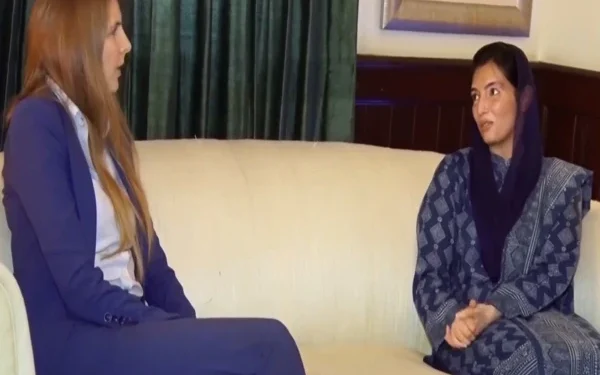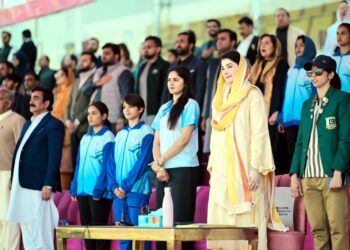Karachi –: In a significant diplomatic and developmental engagement, British High Commissioner to Pakistan, Jane Marriott, met with First Lady and Member of National Assembly Bibi Aseefa Bhutto Zardari at Bilawal House in Karachi. The high-level meeting focused on mutual cooperation in the areas of education, public health, women’s welfare, and youth development, while reaffirming the long-standing bilateral relations between Pakistan and the United Kingdom.
This important gathering was attended by several senior figures from both countries. Alongside High Commissioner Jane Marriott were British Deputy High Commissioner Lance Dom and the High Commissioner’s Political Advisor Huda Ikram, while prominent leaders from Pakistan included Sindh Health Minister Dr. Azra Fazal Pechuho, MNA Shazia Marri, and MPA Qasim Soomro.
The meeting symbolized growing collaboration between the UK and Sindh provincial leadership, with a shared vision for inclusive development, gender equality, and better access to health and education in Pakistan.
Strengthening Pakistan-UK Relations Through Social Development
One of the key takeaways from the meeting was the mutual commitment of both nations to expand cooperation in social sectors, particularly in education, health, women’s empowerment, and youth engagement. These areas have been central to the UK’s foreign development assistance in Pakistan, particularly through initiatives run by the British Council, UKAid, and other UK-funded NGOs.
During the discussions, Bibi Aseefa Bhutto Zardari and Jane Marriott emphasized the need to intensify joint efforts to address pressing challenges in Sindh and other regions of Pakistan. This includes improving access to quality education for girls, enhancing maternal and child healthcare, and creating employment and entrepreneurial opportunities for the youth.
Both parties also acknowledged the importance of cultural ties and people-to-people connections in further enhancing diplomatic relations. The UK is home to a large Pakistani diaspora, many of whom maintain deep economic and social ties with their home country.
Education and Youth Development: A Shared Priority
Education reform and youth engagement were at the top of the agenda during the meeting. Bibi Aseefa Bhutto Zardari underscored the importance of improving educational infrastructure in Sindh, especially in rural and underprivileged communities.
She acknowledged the ongoing support provided by the UK government and British Council in capacity-building programs, teacher training, curriculum development, and digital learning platforms.
“Education is the foundation of sustainable development,” said Aseefa Bhutto Zardari. “Our government is committed to increasing enrollment, reducing dropout rates, and improving the quality of education across Sindh.”
In response, Jane Marriott praised the Sindh government’s efforts in educational reform and reiterated the UK’s willingness to extend technical assistance and funding for new initiatives, particularly those aimed at girls’ education and vocational training for young adults.
Public Health and Women’s Welfare: Supporting Long-Term Partnerships
Another important point of discussion was the public health sector, which has remained a priority in Sindh, especially following the COVID-19 pandemic and recurring challenges such as maternal mortality, malnutrition, and inadequate rural healthcare facilities.
Bibi Aseefa Bhutto Zardari, who has increasingly taken on a public-facing leadership role in development and welfare initiatives, highlighted the steps taken by the Sindh Health Department under Dr. Azra Pechuho. These include:
- The revamping of Basic Health Units (BHUs) in remote areas
- Expansion of Lady Health Workers’ (LHW) programs
- Investments in telemedicine and digital healthcare services
- Public-private partnerships for hospital upgrades
The First Lady also emphasized the need for international partnerships in research, medical training, and health policy planning.
In response, High Commissioner Jane Marriott lauded the Sindh government’s initiatives and offered the UK’s continued technical and advisory support through the UK Health Security Agency, academic exchanges, and medical research collaborations between British and Pakistani institutions.
Women’s Empowerment and Gender Equality: A Core Value
The subject of women’s rights and empowerment featured prominently in the dialogue. As a vocal advocate for women’s issues, Aseefa Bhutto Zardari reaffirmed her commitment to gender equality, echoing the legacy of her mother, Shaheed Benazir Bhutto, Pakistan’s first woman Prime Minister and a global icon for women’s leadership.
“We must ensure that women have equal access to education, employment, and healthcare, while also creating a safe and enabling environment where they can thrive,” Aseefa stated.
Jane Marriott, herself a seasoned diplomat and gender advocate, expressed admiration for the efforts being made in Pakistan and shared examples of successful UK-funded programs in Pakistan that promote:
- Microfinance opportunities for women entrepreneurs
- Legal aid and protection services for victims of domestic violence
- Scholarship programs for girls in STEM fields
- Skill-building workshops for women in rural communities
Both leaders agreed that investing in women leads to broader economic growth and social resilience. They pledged to enhance collaboration between Pakistani and British women-led organizations for advocacy, training, and mentorship programs.
Gaza Crisis and Global Humanitarian Concerns
Beyond bilateral matters, the conversation also included a discussion on global humanitarian issues, particularly the ongoing crisis in Gaza. Bibi Aseefa Bhutto Zardari commended the British Prime Minister’s recent stance on the conflict and reiterated Pakistan’s unwavering support for the Palestinian people.
She urged the international community to take meaningful steps to ensure peace, justice, and humanitarian relief in conflict-affected areas, especially where innocent civilians are suffering.
“Establishing peace in the world is the need of the hour, and the global community must raise a united and effective voice in favor of the oppressed,” she stated passionately.
This perspective resonated with the British side, which has also been involved in diplomatic efforts to de-escalate conflicts and provide humanitarian assistance through international agencies like the United Nations Relief and Works Agency (UNRWA).
Broader Discussions on Regional and Global Issues
The meeting also provided an opportunity to exchange views on the regional geopolitical landscape and global development goals, including:
- Stability in South Asia, including the importance of peaceful Pakistan-India relations
- Pakistan’s role in regional connectivity and economic integration
- Cooperation on climate resilience, especially after the devastating floods in Sindh
- Shared interest in achieving the UN Sustainable Development Goals (SDGs) by 2030
Both delegations agreed that diplomatic engagement must go beyond government-to-government talks and include civil society, youth, and grassroots stakeholders.
The Role of PPP and Sindh Government in Social Development
Aseefa Bhutto Zardari also took the opportunity to brief the visiting delegation on the social welfare initiatives of the Pakistan Peoples Party (PPP) and the Sindh government’s development agenda.
She reiterated the PPP’s commitment to public service and pro-people policies, particularly in education, healthcare, and women’s empowerment. Highlighting the Benazir Income Support Programme (BISP) as a flagship social safety net, she emphasized the importance of institutionalizing poverty alleviation programs with international technical support.
Aseefa said, “We are determined to further accelerate the journey of inclusive development and public service, particularly for our most vulnerable communities.”
Conclusion: A Promising Chapter in Pakistan-UK Cooperation
The meeting between Bibi Aseefa Bhutto Zardari and British High Commissioner Jane Marriott at Bilawal House was more than a routine diplomatic engagement—it was a strategic dialogue centered on shared values and development priorities.
Both sides agreed to strengthen the historic friendship between Pakistan and the UK, with renewed focus on education, healthcare, women’s rights, and youth development. As global challenges demand closer cooperation, such meetings play a crucial role in building trust, fostering innovation, and promoting sustainable development.
The presence of senior government leaders from both nations underscored the importance of the occasion and reaffirmed a mutual commitment to prosperity, peace, and people-first diplomacy.
























